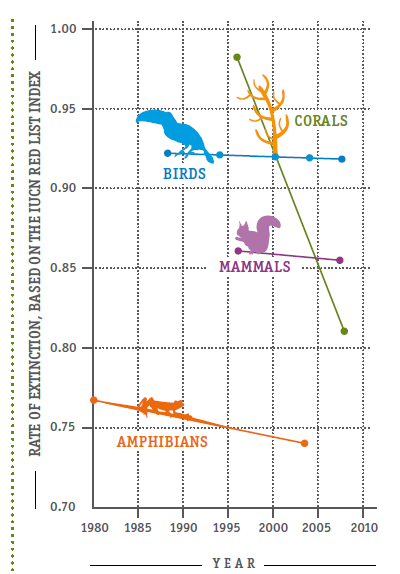Source: Food and
Agriculture Organization of the United Nations, 2013, Kathryn Pintus, IUCN , "The Youth Guide to
Biodiversity" 1st Edition (Chapter 4) Youth and United Nations Global
Alliance. Reproduced with permission.
Chapter 4. Verbatim.
Just as genes make up species, species make up ecosystems, which we will learn more about in the next chapter. Whether directly or indirectly, the survival of a species within an ecosystem often depends on the presence of several other species, and as such, the conservation of biodiversity is of utmost importance.
In Chapter 2 we had a look at some of the main causes of biodiversity loss, including habitat loss and fragmentation, overexploitation, climate change, invasive alien species and pollution. Each of these can place enormous pressure on species, leading to many being driven to extinction (see adjacent figure).
Extinction is a natural process which has been occurring since life on Earth began. There is a natural balance to life with the cycle of births and deaths of individuals. Over time some species thrive and evolution creates fascinating new species whilst others, unable to adapt to changing circumstances, become extinct.
The proportion of warm-water coral, bird, mammal and amphibian species expected to survive without additional conservation actions has dropped since 1980.
Coral species are moving most rapidly towards greater extinction risk. Amphibians are the most threatened group. The IUCN Red List Index ranges from 0 to 1. A value of 0 means all species in a group have gone extinct. A value of 1 means that all species in a group are not expected to become extinct in the near future.
Adapted from: Global Biodiversity Outlook 3, 2010
The problem we face today is not that extinction is occurring, but rather the rate at which it is happening. As outlined in Chapter 2, current rates of extinction are estimated to be 100 to 1 000 times higher than the normal background rate, due to human activities that are having a devastating effect on plant and animal life.


No comments:
Post a Comment